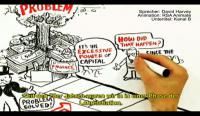After Capitalism triumphed in the nineties nowadays in the light of financial, climate and food crises more and more people wonder if this economic system is capable of solving the problems or rather is part of the problem itself. Immanuel Wallerstein, world renowned world-systems theorist of Yale University in the U.S. talked to Kontext TV at the World Social Forum in Dakar about the limits of the capatalist system.
Debts have pushed developing countries in the 70ies to the edge. The increase of the oil price drove many countries of Latin America and Africa into the debt trap. Even eastern European countries were dependent on the capitalist system. In the early 80th the indepted Poland was forced by the International Monetary Fund to accept the so called structural adjustment programs. The consequence was that workers were squeezed, says Wallerstein. That sparked the Solidarnosc movement in Poland. At the same time Ceausescu in Romania was considered the model boy by the IMF as he paid back the debt while the Romanian government cracked down on its own citizen. Later corporations, states and consumer got indepted, too, accompanied by bursting bubbles.
The decline of the USA has started in the 70th. It has been a slow decline, says Wallerstein. The U.S. have the biggest army of the world but they can't use it. The military apparatus functions rather as an employer and generates a certain level of spending. It didn't work as a military apparatus but has an economic function. This specific dysfunctionality of the U.S. military is also recognized by the right in the USA. Today the old tone of isolationism is rearing his head again as a political possibility.
Social movements have an enormous role to play, says Wallerstein. They would decide whether more exploitation or democracy will shape the future. Therefore the World Social Forum is a very important forum. Strategies and tactics should be developed to minimize the pain in the short run and transform the world in the middle run. Both strategies must be put together.









